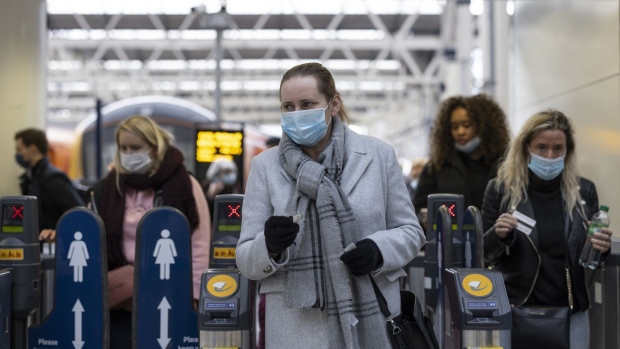Jun 24, 2022
Covid Resurgence Across UK, Europe Driven by Omicron Subvariants
, Bloomberg News

(Bloomberg) -- Covid infection rates are rising again in the UK and across much of Europe, driven by newer versions of the omicron variant, amid concerns that another wave will disrupt businesses and add to pressure on health systems.
In England, the estimated number of people testing positive for Covid-19 climbed to almost 1.4 million -- about 1 in 40 people -- in the week ending June 18, according to an Office for National Statistics report published Friday. That compares with around 1 in 50 people in the prior week. In Scotland, the estimate in the latest week increased to around 1 in 20 people.
New outbreaks elsewhere are causing growing absences from workplaces and worsening labor shortages. In Germany, Deutsche Lufthansa AG is canceling 3,100 flights, adding to Europe’s travel chaos as the summer vacation period gets under way.
Hospitalizations and deaths are trailing far behind, making the latest spread of the coronavirus less alarming, at least for now. With large portions of the population vaccinated and boosted, omicron is less deadly than previous variants, even though it’s more contagious.
While there have been calls for new mask mandates in some places, there’s been no broad push for a reversal of restrictions governments put in place during the height of the pandemic. Austria this week moved to scrap a law requiring Covid vaccinations that was never fully implemented, despite a recent upturn in cases.
Fresh Outbreaks
Omicron subvariants keep evolving, sparking fresh outbreaks across the world, and the rise in prevalence of BA.4 and BA.5 has led to a surge in hospitalizations and ICU admissions in some nations, the World Health Organization said in a report this week. Still, there’s currently no evidence that they cause more severe illness than previous variants, health officials said.
In the UK, the two subvariants have now become dominant, making up more than half of new Covid cases in England, a government report on Friday found. The rise in cases, however, isn’t translating to an increase in serious sickness and deaths because of vaccines, the government said.
UK vaccine advisers last month recommended a new round of Covid boosters for elderly and vulnerable people in the fall, saying the threat could mount again as winter approaches. The new campaign would follow spring boosters for a more limited population.
Subvariant Rising
BA.4 and BA.5 have been detected in about 60 countries and together accounted for more than a third of virus sequences reported to GISAID, the directory of variants worldwide. Of those, BA.5 appears to have gained ground fastest, accounting for a quarter of sequences, according to the WHO report.
The UK government has pointed to a rising hospital admission rate and data showing almost a fifth of people 75 and over haven’t had a vaccine within the past six months, putting them at increased risk of becoming severely ill.
That group, as well as those living in care homes and others who are vulnerable, should get a booster to protect themselves, Mary Ramsay, director of clinical programs at the UK Health Security Agency, said earlier this week.
“Covid-19 has not gone away,” she said.
©2022 Bloomberg L.P.


